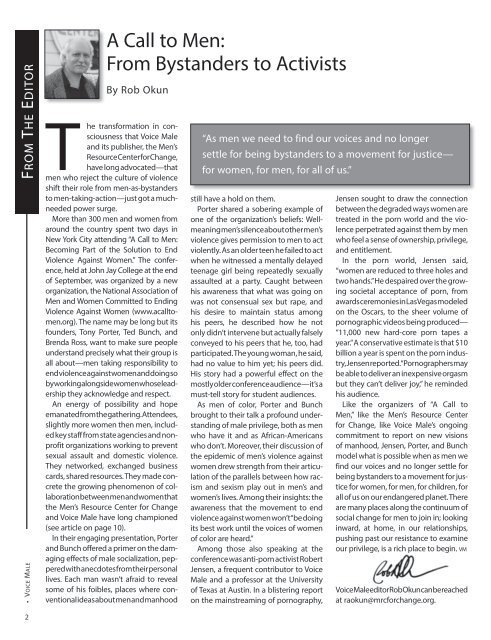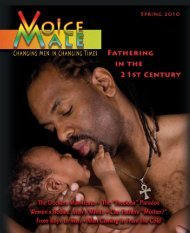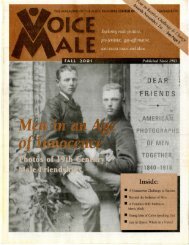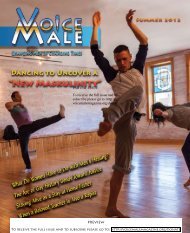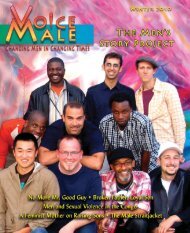to download - Voice Male Magazine
to download - Voice Male Magazine
to download - Voice Male Magazine
Create successful ePaper yourself
Turn your PDF publications into a flip-book with our unique Google optimized e-Paper software.
From The Edi<strong>to</strong>r<br />
• <strong>Voice</strong> <strong>Male</strong><br />
A Call <strong>to</strong> Men:<br />
From Bystanders <strong>to</strong> Activists<br />
By Rob Okun<br />
The transformation in consciousness<br />
that <strong>Voice</strong> <strong>Male</strong><br />
and its publisher, the Men’s<br />
Resource Center for Change,<br />
have long advocated—that<br />
men who reject the culture of violence<br />
shift their role from men-as-bystanders<br />
<strong>to</strong> men-taking-action—just got a muchneeded<br />
power surge.<br />
More than 300 men and women from<br />
around the country spent two days in<br />
New York City attending “A Call <strong>to</strong> Men:<br />
Becoming Part of the Solution <strong>to</strong> End<br />
Violence Against Women.” The conference,<br />
held at John Jay College at the end<br />
of September, was organized by a new<br />
organization, the National Association of<br />
Men and Women Committed <strong>to</strong> Ending<br />
Violence Against Women (www.acall<strong>to</strong>men.org).<br />
The name may be long but its<br />
founders, Tony Porter, Ted Bunch, and<br />
Brenda Ross, want <strong>to</strong> make sure people<br />
understand precisely what their group is<br />
all about—men taking responsibility <strong>to</strong><br />
end violence against women and doing so<br />
by working alongside women whose leadership<br />
they acknowledge and respect.<br />
An energy of possibility and hope<br />
emanated from the gathering. Attendees,<br />
slightly more women then men, included<br />
key staff from state agencies and nonprofit<br />
organizations working <strong>to</strong> prevent<br />
sexual assault and domestic violence.<br />
They networked, exchanged business<br />
cards, shared resources. They made concrete<br />
the growing phenomenon of collaboration<br />
between men and women that<br />
the Men’s Resource Center for Change<br />
and <strong>Voice</strong> <strong>Male</strong> have long championed<br />
(see article on page 10).<br />
In their engaging presentation, Porter<br />
and Bunch offered a primer on the damaging<br />
effects of male socialization, peppered<br />
with anecdotes from their personal<br />
lives. Each man wasn’t afraid <strong>to</strong> reveal<br />
some of his foibles, places where conventional<br />
ideas about men and manhood<br />
“As men we need <strong>to</strong> find our voices and no longer<br />
settle for being bystanders <strong>to</strong> a movement for justice—<br />
for women, for men, for all of us.”<br />
still have a hold on them.<br />
Porter shared a sobering example of<br />
one of the organization’s beliefs: Wellmeaning<br />
men’s silence about other men’s<br />
violence gives permission <strong>to</strong> men <strong>to</strong> act<br />
violently. As an older teen he failed <strong>to</strong> act<br />
when he witnessed a mentally delayed<br />
teenage girl being repeatedly sexually<br />
assaulted at a party. Caught between<br />
his awareness that what was going on<br />
was not consensual sex but rape, and<br />
his desire <strong>to</strong> maintain status among<br />
his peers, he described how he not<br />
only didn’t intervene but actually falsely<br />
conveyed <strong>to</strong> his peers that he, <strong>to</strong>o, had<br />
participated. The young woman, he said,<br />
had no value <strong>to</strong> him yet; his peers did.<br />
His s<strong>to</strong>ry had a powerful effect on the<br />
mostly older conference audience—it’s a<br />
must-tell s<strong>to</strong>ry for student audiences.<br />
As men of color, Porter and Bunch<br />
brought <strong>to</strong> their talk a profound understanding<br />
of male privilege, both as men<br />
who have it and as African-Americans<br />
who don’t. Moreover, their discussion of<br />
the epidemic of men’s violence against<br />
women drew strength from their articulation<br />
of the parallels between how racism<br />
and sexism play out in men’s and<br />
women’s lives. Among their insights: the<br />
awareness that the movement <strong>to</strong> end<br />
violence against women won’t “be doing<br />
its best work until the voices of women<br />
of color are heard.”<br />
Among those also speaking at the<br />
conference was anti-porn activist Robert<br />
Jensen, a frequent contribu<strong>to</strong>r <strong>to</strong> <strong>Voice</strong><br />
<strong>Male</strong> and a professor at the University<br />
of Texas at Austin. In a blistering report<br />
on the mainstreaming of pornography,<br />
Jensen sought <strong>to</strong> draw the connection<br />
between the degraded ways women are<br />
treated in the porn world and the violence<br />
perpetrated against them by men<br />
who feel a sense of ownership, privilege,<br />
and entitlement.<br />
In the porn world, Jensen said,<br />
“women are reduced <strong>to</strong> three holes and<br />
two hands.” He despaired over the growing<br />
societal acceptance of porn, from<br />
awards ceremonies in Las Vegas modeled<br />
on the Oscars, <strong>to</strong> the sheer volume of<br />
pornographic videos being produced—<br />
“11,000 new hard-core porn tapes a<br />
year.” A conservative estimate is that $10<br />
billion a year is spent on the porn industry,<br />
Jensen reported. “Pornographers may<br />
be able <strong>to</strong> deliver an inexpensive orgasm<br />
but they can’t deliver joy,” he reminded<br />
his audience.<br />
Like the organizers of “A Call <strong>to</strong><br />
Men,” like the Men’s Resource Center<br />
for Change, like <strong>Voice</strong> <strong>Male</strong>’s ongoing<br />
commitment <strong>to</strong> report on new visions<br />
of manhood, Jensen, Porter, and Bunch<br />
model what is possible when as men we<br />
find our voices and no longer settle for<br />
being bystanders <strong>to</strong> a movement for justice<br />
for women, for men, for children, for<br />
all of us on our endangered planet. There<br />
are many places along the continuum of<br />
social change for men <strong>to</strong> join in; looking<br />
inward, at home, in our relationships,<br />
pushing past our resistance <strong>to</strong> examine<br />
our privilege, is a rich place <strong>to</strong> begin. VM<br />
<strong>Voice</strong> <strong>Male</strong> edi<strong>to</strong>r Rob Okun can be reached<br />
at raokun@mrcforchange.org.<br />
2


